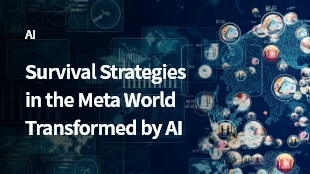In the news, in the newspapers, or in online articles, the term "new normal" appears frequently. The term "new normal," which first emerged in 2008, began to take hold in earnest in 2020 when the COVID-19 pandemic started. Humanity rapidly shifted to digital civilization due to the fear of the virus, and the explosion of remote work has led to a significant change in lifestyles, with the vacancy rate of office buildings in San Francisco reaching as high as 30%. Since then, digital civilization has expanded enormously, including the advent of ChatGPT
The Beginning of the New Normal: Digital Transformation
In fact, the shift of humanity towards digital civilization began after the advent of the smartphone. Since then, all human behavior has changed. In 2016, when AlphaGo defeated Lee Sedol, it was said that AI would change the world entirely. However, at that time, digital civilization could not yet be considered the standard civilization of humanity. But as we can see from the top 10 global companies by market capitalization in January 2020, when the COVID-19 pandemic began, the top five—Apple, Microsoft, Google, Amazon, and Meta (formerly Facebook)—were all platform companies that either manufactured smartphones or changed the standard of human civilization based on smartphones. How has the world changed since COVID-19? In January 2024, Apple was the leader with a market capitalization of 3,776 trillion KRW, but now Microsoft has surpassed 4,000 trillion KRW (roughly double the total market capitalization of all KOSPI-listed companies in Korea), making it the world's most valuable company. NVIDIA, which produces GPUs essential for artificial intelligence, has reached a staggering market capitalization of around 2,600 trillion KRW, placing it in a dominant fourth position. Both Google and Amazon have market capitalizations exceeding 2,000 trillion KRW, indicating that enormous capital is being concentrated in digital transformation companies.
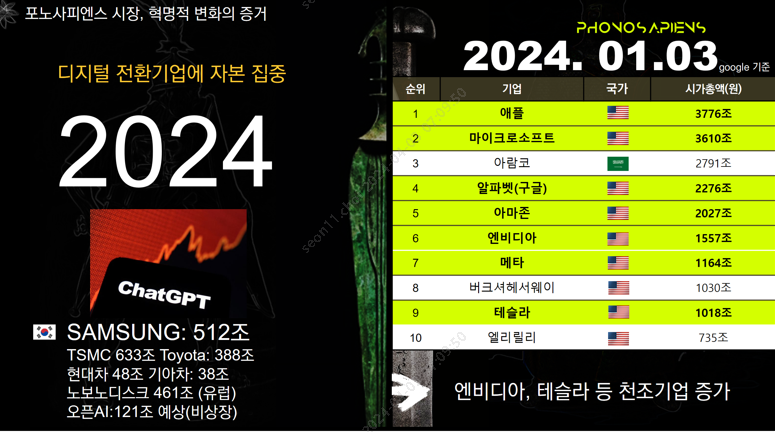
디지털 전환 기업에 자본 집중
2024한국 국기 이미지
- SAMSUNG: 512조
- TSMC 633조 Toyota: 288조
- 현대차 48조 기아차: 38조
- 노보디스크 461조 (유럽)
- 오픈AI: 121조 예상(비상장)
| 순위 | 기업 | 국가 | 시가총액(원) |
|---|---|---|---|
| 1 | 애플 | 미국 | 3776조 |
| 2 | 마이크로소프트 | 미국 | 3610조 |
| 3 | 아람코 | 사우디아라비아 | 2791조 |
| 4 | 알파벳(구글) | 미국 | 2276조 |
| 5 | 아마존 | 미국 | 2027조 |
| 6 | 엔비디아 | 미국 | 1557조 |
| 7 | 메타 | 미국 | 1164조 |
| 8 | 버크셔헤서웨이 | 미국 | 1030조 |
| 9 | 테슬라 | 미국 | 1018조 |
| 10 | 엘리릴리 | 미국 | 735조 |
Market capitalization can be seen as a clear reflection of the expected future growth that humanity envisions. Hyundai Motor ranks third globally in sales, but its future expectations are valued at around 48 trillion KRW, a stark contrast to Tesla, whose market capitalization is about 800 trillion KRW. Of course, while it is necessary to consider domestic economic conditions, it is worth reconsidering whether we have prepared for the future with a goal of becoming "digital humanity"—that is, a society of humanity who use smartphones (Phono Sapiens*)—like companies, such as Tesla, which have been the overwhelming choice for investment.
* Phono Sapiens: A term coined by The Economist in 2015, combining "smartphone" and "homo sapiens," referring to modern humans who find it difficult to live without smartphones.
Have industries beyond the automotive sector, such as transportation, hospitality, finance, and broadcasting, also evolved based on Phono Sapiens? The data clearly shows that they have. Can we even compare the number of people hailing taxis by waving their hands, like 10 years ago, with those using smartphones to book Uber (or Grab in Southeast Asia) or Lyft? The standard has shifted due to the choices of digital humanity, and Uber has become a company with a market capitalization of 157 trillion KRW, despite having a competitor like Lyft. Despite not owning any hotels, Airbnb has a market capitalization of 113 trillion KRW. Now, when people travel, they reach for their smartphones first. Mobile banking has become the standard for banking, and YouTube and Netflix are now dominant broadcasting platforms. The most important advertising and marketing tools for companies have also shifted to platforms like YouTube.
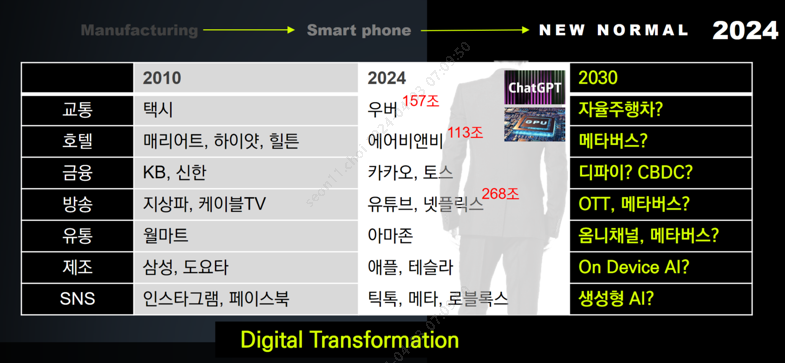
| - | 1020 | 2024 | 2030 |
|---|---|---|---|
| 교통 | 택시 | 우버 (157조) | 자율주행차? |
| 호텔 | 매리어트, 하이얏, 힐튼 | 에어비앤비 (113조) | 메타버스? |
| 금융 | KB, 신한 | 카카오, 토스 | 디파이? CBDC? |
| 방송 | 지상파, 케이블TV | 유튜브, 넷플릭스 (268조) | OTT, 메타버스? |
| 유통 | 월마트 | 아마존 | 옴니채널, 메타버스? |
| 제조 | 삼성, 도요타 | 애플, 테슬라 | On Device AI? |
| SNS | 인스타그램, 페이스북 | 틱톡, 메타, 로블록스 | 생성형 AI? |
As all of humanity shifts towards a digital civilization, our worldview must also change. However, this is not easy for our society. Social inertia, such as "Uber and Airbnb are illegal!" and "Ban cryptocurrency!" exists, and there is a tendency to feel reassured by regulations and a slow pace due to the fear of sudden digital innovation.
On the other hand, what about Tesla, which operates with a digital worldview? Tesla does not advertise. Tesla's CEO, Elon Musk, communicates through posts on X (formerly Twitter). Musk's concept of advertising is through platforms like Twitter or YouTube—not by spending money on ads, but by creating content that people share, building fandoms, or inspiring those who have experienced Tesla's electric cars to post videos on YouTube. This is his "advertising strategy." This is the worldview of a CEO who thinks purely in digital terms. By saving trillions of advertising costs and operating a minimal number of dealerships (five for Tesla vs. 500 for Hyundai/Kia, based on domestic figures), Tesla reduces rental and labor costs, allowing them to invest in the future and make it a reality with initiatives like autonomous driving, "gigafactories**," and the humanoid robots like "Optimus 2nd generation." Therefore, whenever Elon Musk declares his intent to pursue something, the value tied to the future rises. So far, humanity has been investing in companies that are preparing for the future and have growth potential with a digital worldview. The most striking aspect of these companies' strategies is their active development and utilization of AI.
** Gigafactories: A large-scale manufacturing facility that produces high-capacity batteries and related components for electric vehicles (EVs) and energy storage systems. Tesla first used the term when they built their first gigafactory in Nevada, USA.
1) Generative AI: The Game Changer of Digital Transformation
As digital transformation for the survival and prosperity of humanity progresses, a new game changer, OpenAI's ChatGPT, has emerged. Launched in November 2022, ChatGPT reached 100 million users in just two months. Most of its users were students. ChatGPT quickly spread among Generation Z—who are extremely familiar with digital tools due to online classes and digital-based learning during COVID-19—as it helped them with their homework. This is why generative AI has become widespread, unlike during the AlphaGo era. Generative AI is multi-modal, capable not only of generating text but also creating images, composing music, and producing videos. The DALL-E 2 model, based on GPT-3, generates realistic images, while Midjourney uses the GPT-3 model to create artistic images by training on various datasets. South Korean cartoonist Lee Hyun-se, who has created 4,174 works over his lifetime as a creator of one of the most successful cartoon series ever to be published in Korea, is working on the "AI Lee Hyun-se" project, which involves training AI on his artwork to generate images in his style.
14 months after launching ChatGPT, Open AI introduced the GPTs feature, allowing users to train the AI on their unique data to develop customized services (like personal chatbots) and provided the GPT Store (similar to the concept of an app store) where these developed services can be published and shared. Also, the release of "Midjourney V6" has showcased unimaginable capabilities. OpenAI's "Sora," launched in March 2024, is a video-generating service that learns the laws of physics to add realism to its videos. For instance, it can realistically depict objects reflected in eyes or the changing scenery reflected in the glass windows of passing trains. The "GPT-5" model, scheduled for release in 2024, is also expected to see tremendous performance improvements.
In November 2023, a survey was conducted among all students at Sungkyunkwan University. The results showed that 98% of students had used ChatGPT, and an impressive 57% had used its multimodal features, including video and music generation. Students equipped with generative AI skills will eventually enter the workforce, and what's crucial here is that corporate leaders themselves must understand generative AI in order to structure their organizations and leverage these technologies effectively. Generative AI is now linked to a matter of survival. For example, Canada's Klick Labs developed a "Type 2 Diabetes Diagnosis AI Program" based on 18,465 voice data sample recordings. While the accuracy of diagnosing diabetes through blood tests is about 92%, the AI achieves over 86% accuracy. Through this AI, Canadian citizens could get free diabetes tests via an app and innovate the level of health insurance premiums with the saved costs. Currently, AI can predict diabetes, but it has the potential to expand to conditions related to the throat, such as bronchitis or laryngeal cancer, and even to all diseases connected to the brain. This proves that all of this is possible by having data.
With the emergence of generative AI, the global economy is experiencing accelerated competition among big tech companies and undergoing significant societal transformation. Microsoft invested 13 trillion KRW in OpenAI and acquired ChatGPT, while CEO Satya Nadella introduced MS Copilot over the past year, making Microsoft the world's most valuable company by market capitalization. Apple is strengthening its on-device AI services by preparing health care generative AI services like "Quartz." Meanwhile, Elon Musk, a co-founder of OpenAI and CEO of Tesla, independently launched an AI development company called "X.AI." Google, which introduced the Transformer algorithm—the foundation of generative AI—has released a multimodal generative AI model called "Gemini." Meta is also gaining significant attention with its open-source model, "LLaMa." Amazon offers the "Bedrock" service, enabling the use of various models on its cloud infrastructure.
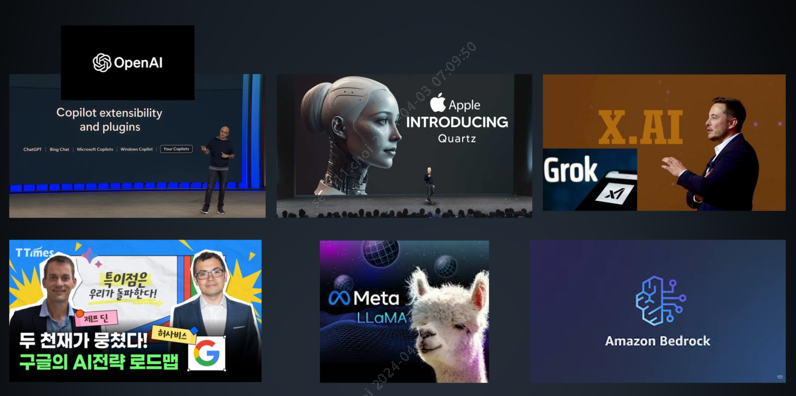
- OpenAI
- Apple INTRODUCING Quartz
- X.AI, Grok
- 두 천재가 뭉쳤다! 구글의 AI전략 로드맵
- Meta LLaMA
- Amazon Bedrock
Society is already experiencing major upheaval amidst this chaos. In 2023, the Writers Guild of America, which included participation from South Korean webtoon artists, went on strike. As AI advertising became a trend among companies, Google fired 30,000 employees who were previously handling traditional advertising roles. By February 2024, Silicon Valley was in deep trouble. There was an oversupply of software engineers, except for those specializing in generative AI, while demand for semiconductor engineers skyrocketed. In June 2023, OpenAI CEO Sam Altman visited South Korea and expressed high expectations for "investment in the Korean AI startup ecosystem" and for the "Korean semiconductor Neural Processing Unit (NPU)." South Korea ranks among the top three countries in the world for generative AI, alongside the US and China. Why is this the case? Europe and Japan have been lukewarm about digital transformation, and without data platforms, they lack the data needed for AI training, putting them far from achieving "AI sovereignty***." Also, GPUs, which support training speeds 100 to 1,000 times faster than general CPUs, have become crucial for providing generative AI services. With NVIDIA holding a monopoly in this area, Sam Altman announced plans to manufacture NPUs in the US after securing 9,300 trillion KRW in funding. Notably, only a few countries like South Korea, Taiwan, and the US have semiconductor manufacturing ecosystems capable of producing chips below 7 nanometers. In the AI sector, where capital will continue to concentrate, South Korea stands to gain tremendous opportunities. Even companies not directly related to these fields face the critical task of figuring out how to use AI.
*** AI Sovereignty: Refers to having AI models built on national language data, allowing countries to maintain AI technologies based on their own data without being dependent on foreign companies or big tech (capable of learning from multiple languages and cultures while adhering to domestic regulations).
2) The Evolution of Digital Transformation, AI Transformation (AX)
In the past, South Korea grew from a developing country and rarely ventured into new challenges. The hierarchical and rigid structure of organizations and education for students reflected this. However, there is nothing to merely follow today in terms of manufacturing. We are the leader in 3-nanometer semiconductors and OLEDs, holding 82-90% market share. For example, Hyundai Motor Company has dispersed its internal combustion engine R&D teams and is now focused on innovation in hybrid, hydrogen, electric, and autonomous vehicles to compete with Tesla.
Current digital transformation cannot make a single step forward without a foundational worldview of "becoming a leader in the digital age by integrating AI into digital civilization." This is the critical task for corporate leaders. Digital transformation is about changing the worldview. The talent companies now seek must possess strong digital capabilities. Have you worked on projects involving generative AI, big data analytics, data marketing, or social media marketing on platforms like YouTube? This is the new requirement. Platforms and gaming companies in Pangyo also operate in the digital realm, requiring global-level technology. Standards must change to accommodate generations that have grown up in a borderless digital civilization, breaking away from traditional inertia. We need to respect creative ideas and allow the opportunity to try new things. Here, efficiency and productivity are key, which AI and digital will provide. Even the catchphrase of CES 2024, "AI for All," hints at the dawn of the AI era in a digital civilization. "All Together, All On" emphasizes merging and integrating everything to offer comprehensive solutions to customers, with AI at the core.
To adapt to these changes, even our role models must evolve. We need role models like Steve Jobs, Bill Gates, Mark Zuckerberg of Meta, Sam Altman of OpenAI, Vitalik Buterin, the creator of Ethereum, and Austin Russell of Luminar, who supplies advanced components for autonomous vehicles—the people who believe that taking on new and innovative challenges is the key to building truly great companies and making money. In education, we should learn from the approaches these new role models have demonstrated—learning through YouTube, networking through communities, and absorbing the knowledge of the times by engaging in discussions with peers. There is a saying: "A nation that forgets its history has no future." We must learn from the 20-year history of digital civilization—which includes the Third Industrial Revolution, the Information Revolution, platforms, contactless technologies, and AI—and expand our worldview to keep pace with a changing humanity.
From the Digital World to the Meta World!
The digital civilization created by digital natives of the MZ generation is now the standard civilization. Therefore, shifting our worldview is even more necessary. The world created by digital natives has gone beyond analog to digital, expanding into a new realm—the transcendent "meta world (industry)." The term "meta world" refers to a new digital realm where the MZ generation lives, transcending borders, language barriers, and cultural differences to form an integrated market based on a unified worldview. "Meta Industry" involves industries newly defined and explored within the meta world, leveraging IT technologies like generative AI, big data, robotics, and IoT, and incorporating digital economic concepts such as the metaverse, NFTs****, and cryptocurrencies. In the case of the Metaverse, big tech companies have invested over 300 trillion KRW in the past three years to develop numerous platforms, including Roblox and Zepeto, although they have not achieved significant success. However, related technologies have seen tremendous advancement. Korea Hydro & Nuclear Power has used gaming tools to implement the Korean-designed nuclear power plant, APR1400, as a "Metaverse (Digital Twin)" and is currently competing with France for a nuclear power plant contract in the Czech Republic. Korea Hydro & Nuclear Power also plans to incorporate artificial intelligence in the future, and digital capabilities, such as AI for automated safety diagnostics, IoT, and the Metaverse, have become essential for global business expansion.
**** NFTs: Non-Fungible Tokens (token representing digital assets with scarcity).
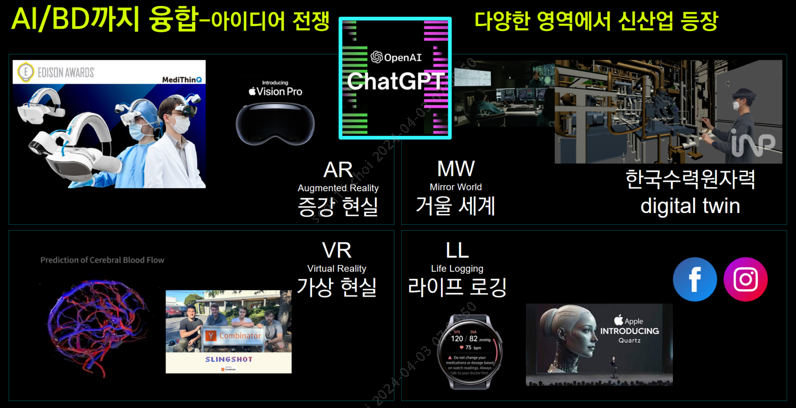
- AR (Augmented Reallty) 증강 현실
- MW (Mirror World) 거울 세계 - 한국수력원자력 digital twin
- VR (Virtual Reality) 가상 현실
- LL (Life Logging) 라이프 로깅
Let's look at examples of the meta industry expanded by AI. In September 2021, when Squid Game was released on Netflix, some predicted it wouldn't succeed due to the one-inch barrier of subtitles. However, by October of that year, Squid Game had ranked number one in every country where Netflix was officially available. This illustrates the content industry as part of the meta industry, where 1 billion people exist without borders or language barriers. In the past, TV, dramas, and comics were controlled by legacy media. However, with the rise of webtoons, YouTube, and Netflix, all the power has shifted to consumers. This has resulted in an economy dominated by subscriptions and likes—a "fandom economy."
Recently, many people aspire to become webtoon creators. Korean webtoon artists are gaining global popularity, leading Naver and Kakao's webtoon platforms to rank number one in 100 countries worldwide. Kakao's "Piccoma" platform, which entered the Japanese market, generated 900 billion KRW in sales in Japan alone in 2023. Naver Webtoon is expected to be listed on NASDAQ this year, with an annual revenue exceeding 2 trillion KRW, and Goldman Sachs has valued the company at approximately 4.5 trillion KRW. Examining the transformation of the content industry, the audience has expanded from 50 million to 1 billion through platforms, leading to increased platform revenue and consequently higher earnings for creators (the highest income in 2022 was around 12.4 billion KRW). As web novels, webtoons, and dramas gain popularity among consumers, their success drives adaptations across formats—for example, if a web novel succeeds, it may be adapted into a webtoon and eventually a drama. Notable examples include "Extraordinary Attorney Woo" and "True Beauty."
The content industry leverages generative AI in the new digital world to produce media and expand into other sectors, such as the food industry. "Extraordinary Attorney Woo" and "The Glory," the world's third most-watched drama in the first half of 2023, both prominently featured gimbap. In 2023, a company called "Olgod" from Gumi exported frozen gimbap, "Baba Gimbap," which caused a sell-out frenzy at the major US discount store Trader Joe's. This expansion of the meta industry isn't limited to Netflix but also involves YouTubers and TikTokers as intermediaries. During the airing of these dramas, there was a surge in gimbap-related content on YouTube. Trader Joe's participated in the Korean Food Expo, where they met Olgod and signed a contract. Olgod spent a year on R&D to produce delicious frozen gimbap, achieving tremendous success. Another example is Samyang Foods, which saw exports account for 68% of its revenue in 2023, with its flagship product, "Buldak Ramen," helping the company surpass 1 trillion KRW in sales for the first time. This "Buldak Ramen Challenge" was initially popularized by BTS' Jimin.
Unlike in the past, small- and medium-sized enterprises now have opportunities to enter global markets through the meta industry, all thanks to consumer demand. This is a new ecosystem shaped by the changing consumption patterns of digital natives, where it's not just about adopting AI but fundamentally transforming business models.
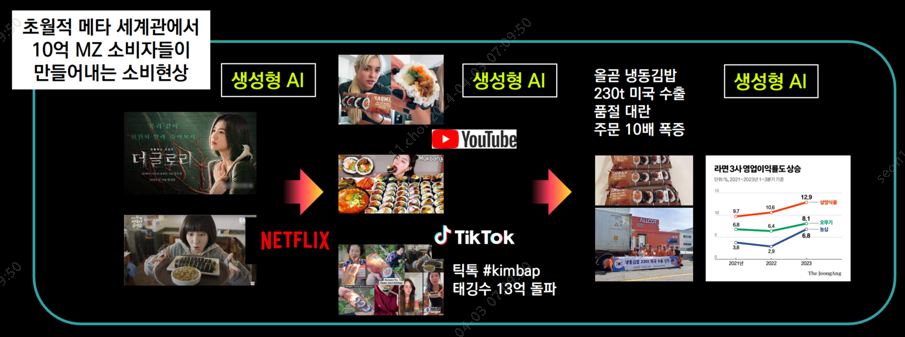
- NETFLEX
- YouTube, TiKTok (틱톡 #kimbap 태깅수 13억 돌파)
- 올곧 냉동김밥 230t 미국 수출, 품절 대란, 주문 10배 폭증
Entertainment companies like YG and SM have ventured into metaverse and NFT businesses, creating new revenue streams by turning idol characters into IP using generative AI on metaverse platforms, targeting the MZ generation. The gaming industry is following a similar path. Games have become an integral part of the digital generation's lifestyle, with companies like Nexon and NCSoft integrating NFTs into their existing games and expanding AI adoption amidst fierce global competition in the metaverse and NFT sectors.
What about advertising and marketing? With teenagers and those in their 20s using various digital channels like TikTok and YouTube, generative AI is being used to create marketing materials tailored to each channel. "Jasper," used by 50 of the world's top 100 companies, has learned 30 years of marketing copies and can generate 200 marketing phrases per minute. Marketers can select and edit drafts to add detailed product descriptions, and with the image generation capabilities of "stable diffusion," creating advertising images or editing photos for online stores becomes straightforward. Execution strategies in advertising and marketing are evolving based on the worldview of the meta-world.
In the financial services market, investments via smartphones have expanded, leading to an explosive increase in individual investors engaging in foreign stock trading. In 2021, the number of overseas stock trading accounts at the top 10 domestic securities companies surpassed 3.21 million. Furthermore, OpenAI's Sam Altman launched "Worldcoin," and Tesla introduced car insurance, showcasing the growth of transcendent financial services like fintech and the coin/cryptocurrency economy. The retail industry has already made the digital landscape its standard, expanding metaverse/NFT-based advertising and marketing and enhancing generative AI-based shopping coaching services as it prepares for the AI era.
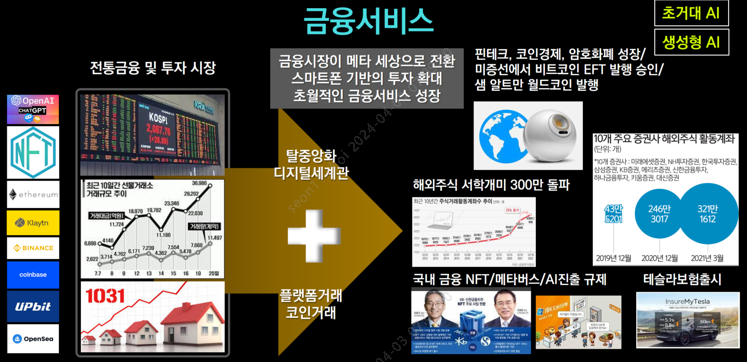
금융시장이 메타 세상으로 전환, 스마트폰 기반의 투자 확대, 초월적인 금융서비스 성장
초거대 AI, 생성형 AI- 전통금융 및 투자시장
- 탈중앙화 디지털 세계관 + 플랫폼거래 코인거래
- 핀테크, 코인경제, 암호화폐 성장 / 미증선에서 비트코인 EFT 발행 승인 / 샘 알트만 월드코인 발행, 해외주식 서학개미 300만 돌파, 국내 금융 NFT/메타버스/AI진출 규제 / 테슬라보험출시
Digital twins and autonomous construction machinery have emerged in the construction and heavy industry sectors. In the keynote speech at CES 2024, HD Hyundai's Vice Chairman Kisun Chung presented "Xite Transformation" as a solution to humanity's sustainability challenges, aiming to transcend the limitations of time and space. "Xite" expands the concept of the physical "site" in construction, implementing AI-based unmanned and autonomous construction equipment, digital twins, ecofriendly practices, and electrification to create smart construction sites for a better human future[1]. An independent entity of Hyundai Motor Company, Supernal unveiled the advanced air mobility (AAM) model "S-A2," introducing future air mobility driven by AI-based transportation[2]. Hyundai Motor Company also proposed a transition to software-based design, along with autonomous driving, infotainment, AI navigation, and personalized services tailored to drivers' lifestyles[3].
So, how about the healthcare sector, where the adoption of generative AI and digital technology could lead to the most revolutionary service improvements? Not only we are the leader in medical technology, but we have also accumulated long-term health screening data. Since we are the only country in the world where people visit hospitals before getting sick, the potential applications of generative AI based on accumulated medical data are limitless. Digital platforms now enable education and surgical training, and health care services that use "AI+Watch+Sensors+Data" are emerging.
By applying the business model of the evolving meta-industry to the digital health care sector, we could produce medical dramas via platforms like Netflix that introduce health screening data and smart health care, such as "AI Doctors." These concepts could then spread through YouTube and TikTok. Customers would engage in a "Digital Health Care Experience Program" that provides health screenings, wearables, and sensors, allowing them to receive regular health checks and AI doctor coaching, evolving into a "K-Digital Health Care Service."
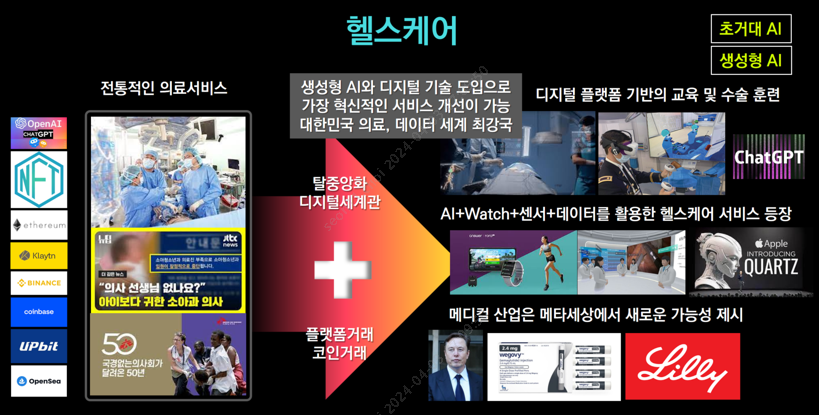
생성형 AI와 디지털 기술 도입으로 가장 혁신적인 서비스 개선이 가능 대한민국 의료, 데이터 세계 최강국
초거대 AI, 생성형 AI- 전통적인 의료 서비스
- 탈중앙화 디지털세계관 + 플랫폼거래 코인거래
- 디지털 플랫폼 기반의 교육 및 수술 훈련, AI+Watch+센서+데이터를 활용한 헬스케어 서비스 등장, 메디컬 산업은 메타세상에서 새로운 가능성 제시
Creating Fandoms in the Meta World!!
In the meta world and digital economy, fandom is power, and companies are also focusing on building their fandoms. Advertising is no longer done through traditional broadcasting but is instead driven by consumers themselves, with communities and comments forming the fandoms of the MZ generation. Musinsa became the 10th unicorn company (with a market capitalization of 2.5 trillion KRW) by selling 500,000 pairs of pants (worth 25 billion KRW) thanks to 110,000 comments. Novo Nordisk rose to become the number one company by market capitalization in Europe and the world's leading pharmaceutical company, all from just one tweet by Elon Musk mentioning Wegovy (medication for obesity) as his way of slimming down. Another notable fandom-driven company is led by Sohee Kim, CEO of "Nanda." Kim started a clothing store called "Style Nanda" in Dongdaemun, where she handled everything from modeling and management to design and advertising, making her a standout figure akin to a mini Elon Musk in the realm of South Korean small businesses. At age 35, just 13 years after founding Nanda, she sold the company to the L'Oréal Group[4]. Jay Park's soju brand "Won Soju," which excites the MZ generation, held a pop-up event at "The Hyundai," and through its fandom and comments, 25,000 limited edition bottles sold out in just 35 seconds during the second online sale. Another example is "Baby Shark," the most viewed video on YouTube. It is the only video to surpass 10 billion views and currently has over 14 billion views, demonstrating how consumers can create a powerful fandom. In today's digital world, new consumer ecosystems are built not through advertisements but through experiences that lead to comments and enthusiasm, with data revealing trends and AI enabling services based on them.
Fandom correlates with comments, and experiences generate those comments. Therefore, we must create better experiences. How can we generate empathy? This is the essential question in the "experience design era." In 2022, Samsung Electronics restructured its product/technology-centric division into the "Device eXperience (DX)" division, shifting focus to customer experience. Steve Jobs' approach to product development combined technology with the humanities and humanity, aiming to create "products that make the customer's heart sing." The company's Environment, Social, and Governance (ESG) management is driven by demands from empowered consumers: "Protect the planet, contribute to society, and operate transparently." This can be seen as a realization of humanity, which forms the foundation of fandom creation. To build fandom in the meta world, companies should expand their learning about the humanities, arts, and popular culture of the MZ generation. Cultural movements that gain massive consumer support always contain elements that resonate deeply with the hearts of current humanity, and this understanding can only be truly gained through direct experience. Humanities and art are challenging because they can only be truly grasped through experience, which allows us to develop their ideas, trends, fandom, and creative sensibilities.
Afterword
Will we be able to thrive in the next 30 years? In 2022, South Korea ranked sixth among the world's powerful nations, according to U.S. News. Korea is uniquely distinguished in modern human history for transforming from brand- and company-centric management to a consumer-focused and ecosystem-driven approach over the past 120 years! We have achieved the miracle of rising from a developing nation to becoming a great power. So, what about the future? In the new digital ecosystem, the meta world, where the current population of 1 billion will grow to 2 billion, we just need to create new fandoms. The popularity of K-pop is overwhelming, South Korea ranks second on Netflix following Hollywood, and its soft power is also ranked second globally. South Korea is successfully transitioning to a global fandom ecosystem and is excelling in the fandom economy. By integrating this with industries, such as manufacturing, distribution, and medical services, we have the potential to create a new meta industry. As the data shows, South Korea has the highest potential in the world to achieve this. Dreams like being "number one in semiconductors" and among the "top three global automakers" have already become reality. Elon Musk once said, "It's a true dream only when people say you're crazy." With the same strength that achieved today's miracles, we should not fear AI, the new civilization, but rather embrace the shift to an AI-driven metaverse worldview. Search, experience, and network to absorb relevant knowledge, strengthen your digital and AI muscles, and create a new future.
# References
[1] https://kr.aving.net/news/articleView.html?idxno=1787416
[2] https://www.donga.com/news/article/all/20240110/122982287/1
[3] https://www.hyundai.com/worldwide/ko/brand-journal/mobility-solution/sdv
[4] https://www.hankyung.com/article/2018062114201

Strategic Marketing Team at Samsung SDS
Had been in charge of digital transformation in samsungsds.com, solution page planning/operation, based on her work experiences in IT trend analysis, process innovation, and consulting business strategy, and is now in charge of content planning and marketing through trend/solution analysis for each main business sector of SDS.
- The Rise of Generative Enterprises: Reshaping the Future of Business With Generative Technologies
- ESG Framework for Sustainable AI Business
- B2B Companies Transforming Into 'Generative AI-Centered'
- The Future of AI as a Service (AIaaS)
- Global Trends and Implications in AI Risk Management
- Copilot: The Key to Hyperautomation
